Wendy Eisenberg had their eyes fixed. It’s blunt but it’s true. The Brooklyn composer and multi-instrumentalist finally took the step of getting surgery to repair their sight with Lasik. It’s a rare procedure during which you remain entirely awake, experiencing shifting lights and transfiguration in real time. The risk of blindness was perhaps worth the result of clarity. But what is clarity really worth?
In their new album and “song cycle for improvisers,” Eisenberg takes a life of blurry exploration of rock, noise, and jazz, constantly shifting parameters and constant collaboration, and renders it with fervor and ambition. VIEWFINDER has some of the most deeply introspective and philosophical songs in their discography, and some of the rawest and most expansive. Despite the concise point of inspiration, the album seeks to push against the presumption of sight. Hear the music as music first, feel the sound reverberate in your ears, before intellectualizing and theorizing about the meaning. Those themes and inspirations have deep roots, but they’re almost designed to remain invisible.
VIEWFINDER is a self-aware and thorough excavation of the gaze, of art’s value and how we engage with it, all filtered through Eisenberg’s kaleidoscopic guitar-playing and a roaring jazz band. Last month, I caught up with them via Zoom and talked about songwriting, ghosts, lasers, frames of reference, and more.
Do you have clear memories of when you fell in love with music? What was your childhood relationship to it?
Wendy Eisenberg: I showed a pretty early predilection. When I was three or four, we had a music box that played “Greensleeves” and I could figure it out really easily on the piano. My family aren’t musical in the sense of traveling and performing, but my dad has always really followed British indie rock. I came into consciousness with my dad singing the Everly Brothers and Gram Parsons songs. My mom was really into classic songwriting, like jazz and musical theater, MY FAIR LADY-type stuff. It wasn’t far off that something would have happened [musically with me]. What really drove music into being the centerpiece of my life was that I was and continue to be a really anxious person. When I was a smaller anxious person, the only thing that would get me to fall asleep or calm down was my dad singing to me.
That’s really sweet. I always had to have a CD playing before I could fall asleep when I was little, which still persists. From your mom’s influence, did you have any connection to musical theater when you were developing your taste?
WE: For a certain type of artsy kid in the middle class, you just get exposed to weird musical theater repertory when you’re younger. I went to a summer camp that was pretty focused on the performing arts, and I learned how to read music in a pit orchestra there; it’s always been bubbling around. As an art form, I really value it. There’s a lot of innovation, especially with commitment to melody and leitmotif. Theater’s not at the center as much as it was, but when I was growing up, I was in the pit for a lot of things.
Were you playing guitar in the pit or something else?
WE: Guitar and banjo.
When did you start playing guitar and banjo? Those have been two very key parts of your performance and writing.
WE: I started around when I was 11. Because of the “Greensleeves” incident, my parents decided that I should probably learn piano. I didn’t love it, but I loved music. My piano teacher was amazing. Because of my parents’ divorce, the only way I acted out was firing her, which I feel so bad about as someone who has since taught kids that were my age. Afterward, both of my parents taught me different parts of the guitar, and I started teaching myself. I needed music, I just didn’t need it to be piano at the time.
That’s another pretty standard middle class artsy kid experience. You start on piano and jettison it by your mid-teens for whatever instrument you actually pick. There’s definitely a lot of value to starting on piano, even compared to other instruments, since it’s pretty instinctive. Not quite as instinctive as singing.
WE: With the piano, you can visualize it. When you get something wrong with singing, it’s hard to even trust that it’s right or wrong because it’s stuck in your head.
When did you begin to delve into jazz and improv? At least when I was growing up and playing music, I was terrified of improvisation. It took a really long time for me to kind of get there.
WE: Why were you afraid of it?
I was really self-conscious, due to that same anxiety that you mentioned. I’m also a very anxious person. Losing that sense of self in the improvisation became really valuable, and is definitely how I feel comfortable with it now. You almost have to make a fool of yourself.
WE: Even talking about abandoning yourself being the locus point of the fear of improvisation is interesting. Like many bourgeois artsy kids, I was encouraged not to have a self in this weird way. Then all of a sudden, you end up really having a self and having a reaction to it. As soon as something like improvisation gets on the table, you can’t take solace in the fixity of an idiom any longer, especially when you’re learning. Theorizing aside, it’s hard to narrativize something so intimate to your childhood. I think I got into jazz because I wanted a challenge and more harmonic colors; I don’t think I necessarily would have put it like that at the time.
I was in indie, rock ‘n’ roll, and pop punk bands when I was around 16. The second band that I was part of had this kid who was super into prog. He showed me John Zorn’s Naked City and Trevor Dunn’s Trio-Convulsant. I learned about Mary Halvorson when I was in the seventh grade. I had these too-early-for-it moments. This kid was really into Primus and Ween and King Crimson. He gave me a data disc filled with prog and I really loved it. When you get into prog when you’re young, you’ll see that they’re covering something like “Donna Lee,” and then you want to play jazz. That’s how it worked for me. I had friends that were interested in weird stuff from the jump. I wanted to have more expressive tools at my fingertips than an indie rock vocabulary, which seemed a little bit less expansive to me.
When did you start writing your own music and lyrics, and wanting to be the root of a song’s creation?
WE: As soon as I started feeling like I knew how to play guitar, I was driven to write songs. I was already singing a little bit because of musical theater. I always wanted to do both at the same time. Within a couple months of playing guitar, I was writing songs because it was what I thought you just had to do. I was learning a bunch of songs from random tabs, like “Over the Hills and Far Away” by Led Zeppelin, but there would be a moment where I just wanted to write something that was my own. I wrote hundreds of songs as a kid. Like with learning guitar, I try to learn something, get distracted by learning it, and it turns into creating something that I want to hear.
As you’ve written and released music, how have improvisation and composition informed each other?
WE: The best way to get to know anything, specifically anything that’s faintly linguistic in structure like improvisation or composition, is to have to do it on the fly. If you really want to know what you know on guitar, you have to try freestyling. These things have always co-existed for me, because you can’t really write anything without making it up. Even though some people find a lot of benefit in viewing them as fixed disciplines, I feel like they blur together, especially in a long piece like VIEWFINDER. It’s really for improvisers; there’s a lot of space in the compositions for the musicians to deal with parts that are somewhat fixed and to maybe repurpose them.
They’re two sides of a coin, especially when they’re an integral part of one’s practice. Over the last 10 years, how has your relationship with your instruments and your approach to creating changed?
WE: I always had this idea that when I was 32, which is how old I am, I would be kind of like Ben Monder. I’ve fixated on him a lot. I think about what he represents to me as an artist and as somebody who keeps getting better technically, in a way that’s actually kind of shocking when you hear it. I thought that growth would not be linear, but would be vertical. I would reach some degree of fluency on the instrument, and all of a sudden it would be undeniable. I know how to do every single thing, I can play this or that crazy polyrhythm. I still work towards that every single day, always working on things that are harder for me, but the way that I perceive the growth of my own practice is closer to a deepening. It feels more lived-in now.
I reached a point pretty early, relatively speaking, around when I was 23, where I was hyper-fluent in jazz. Not to be this kind of guy, but I felt like I was a really good jazz guitar player; it just felt so natural and accessible to me. Now it’s a little bit less accessible, but there’s so much more that I can do with my right hand. There’s a kind of leveling off that happens where your focus reveals itself to you. Even when you might lose some of the vocabulary of something like jazz, there’s this effect where even if you technically suck a little more, it’s more lived-in because you’re older and it soaked in. I feel that as a guitar player, but I especially feel that as a singer. For years, I just wouldn’t work on singing. I had this terrifically abusive mentor when I was in late middle school, early high school. He would say that everyone else is a good singer and I shouldn’t even try to do it. A really cartoonishly evil man.
We hate him.
WE: He said some fucked-up shit, and it made me never want to work on singing. The first thing I’d ever done on guitar, besides learn how to physically play, was to write songs. When I started to write songs in earnest again, when I was 23, my voice felt really untrained. Over time, it got stronger because I just kept doing it. I took a couple voice lessons and it got way better. It feels more lived-in now and I can trust it more.
Especially with singing, just living in it increases your confidence and your fluency. Hand-in-hand with the nonstop writing and composing, you’ve been a pretty nonstop collaborator. How has playing with so many different people in different iterations influenced your approach to music-making, both as a performer and composer?
WE: When I write alone, I don’t really feel like I’m alone. The way that I write is very referential to pop and jazz techniques that have been around for a long time. I feel like I’m hanging out with the ghosts of these forms. I’m seeing what they have to say, but I’m not doing it consciously. I’m not like, “Today, I’m doing a Bacharach thing,” unless I really want to study it.
You’re not dialing up a specific ghost.
WE: Every other line, there will be a new ghost that comes out. I have this song that really explicitly takes like four notes from an Elliott Smith song. I didn’t really choose to do that, although I was listening to him so much because I always do. He just came in and said hi for a second, and then the next line, it’s a Judee Sill technique. It’s not like it’s all patchwork, but having a healthy and expansive listening diet is crucial to develop these kinds of solo collaborators. When I’m working with other people, they can fight back more and it feels better. They have all the attendant physicality that ghosts don’t have.
For example, if I’m working with Caroline [Davis], there are going to be things that she will want to do and I have to determine whether I like it or not, and if I don’t, do I communicate that to her? Or is it not that important? You have concerns that are a kind of compositional resource themselves. How you talk to collaborators is part of composing. It feels like a continuum. “Alone” is a weird myth at one end of the spectrum, and having collaborators makes the multiplicity already inherent in a musical tradition really literal and more steeped with the physicality of the present. Everybody you encounter, from a ghostly compositional friend whispering in your ear to Editrix, is going to teach you something that you cannot do in your body alone. When I write with Editrix, always in the room together, there’s something that becomes accessible that I cannot touch in any other compositional moment. It has to be those dudes. It’s just so cool, you know? That’s why I like to collaborate with so many different people.
It’s a symbiotic catalyst where you’re activating a certain energy or path of thinking when you’re in the room with the same people, or with new people, that you wouldn’t have been able to find in the void. No one should write music in purgatory.
WE: If they do, they should remember that it’s just a state of mind.
How does the musical undercurrent reveal itself as you start working on a new record or with a new group?
WE: I barely listen to my own sound when I play because the other things that are going on are more interesting to me. I’m stuck with it. When I’m talking to you right now, am I listening to my own voice or am I watching how you respond to what I say? As far as guitar sounds go, tone is in the hand and you’re going to play how you play. Unless you’re really wealthy, you’re limited by your materials. I just have a couple pedals that I’ve bought here and there that sound good to me. Usually, I don’t give a shit how I sound. For years, until I started working with the Bill Orcutt Guitar Quartet, I didn’t even know what Fender amp I liked the best, I just had a Princeton. They all had opinions about it, especially Ava [Mendoza]. They all knew what a Hot Rod is and I never did. I felt really stupid in a kind of prideful way.
Using Editrix as an example, because they’re my favorite thing, Steve [Cameron]’s bass parts are really trebly, coming out of this Nomeansno type of playing. The options I have are to play a little bit lower, in unison, or to be like Melt-Banana, kind of high, almost fluty. Because the sonic range that he’s taking up is so specific, if I want to write the complex parts that I end up wanting to write, I have to be out of the way for you to be able to hear Steve’s complexity. The drums are doing so much in that band. If what I’m doing sounds like the rhythmic beating that the cymbal is doing, like a ringing that’s been exposed under a microscope of what’s happening on the cymbal’s level, then I feel like I’ve done my job. That’s compositionally interesting to me. I’m not thinking specifically about tone, but I am thinking orchestrationally about where things are sitting in some imaginary, perfect mix.
You’re arriving at spaces that you can occupy within each group and where they intersect naturally as the music comes together while still wanting to explore your own space, letting parts speak for themselves instead of just noodling all over them.
WE: Some of my favorite music pays no attention to that. I love the parts of [Captain] Beefheart’s music where two guitarists with really similar tones are playing kind of the same, kind-of-different things next to each other.
It’s off by just a little bit.
WE: It doesn’t feel like they’re counting it, even though it’s so rigorous. That’s the fucking thing. Sometimes when I play lower on the guitar with Steve, it feels like that to me. I succeeded because that’s a specific ghost that I love. On VIEWFINDER, where it’s closer to traditional jazz instrumentation than rock, I’m thinking about what the piano is doing that my guitar can sit within and what extended techniques I can do that sound like synthesis, like the woodiness and richness that we forget; the guitar is a transposed instrument when it’s notated. All of the low-high ambiguity of a guitar fitting between piano and synthesizer, or trumpet and trombone, is really different than the kind of rock band problems I usually have to solve. I had to really purposefully not listen to my guitar while spending time with that, because I wanted to know what was missing. Maybe I was doing what was missing when I was playing it. There’s this being-nonbeing thing that happens when you’re trying to figure out where your sound belongs compositionally.
Holding both things simultaneously, listening to what everyone else is doing and what spaces they’re occupying, is super important with larger ensembles, even if it’s not a solo break and you’re playing underneath. Like, “Here’s the 12-bar solo section, everyone play two degrees quieter so we can hear this eighth grader rip a trombone solo.” No shade to the eighth grade trombone players. We need them.
WE: We really do, if we need anything.
Especially with VIEWFINDER, your records tend to go very deep inside a certain concept or theme, whether it’s more ambient or something as literal as getting Lasik surgery. When does the core idea start to reveal itself? The sound of a record is one thing, but what you’re writing and singing about is sometimes more invisible. You can hopefully translate the feeling with the music.
WE: It’s funny because I am the sort of person who could probably lie to myself really successfully about thinking about it from the jump, but I actually did have a premonition that I wanted to write something longform about sight. It came out of an academic desire to chronicle. I’ve always thought that it’s strange that we put the primacy of our adjudication of music, our discussion of it, on the things that are easiest to visualize, like the fact of an instrument rather than the sound of it. Like it has to be one-to-one. If you hear a trombone, you’re hearing a trombone. That’s really different than watching someone play trombone on video with the sound turned down. There’s so many different distancing effects that happen when we think about music in that one way.
Sight biasing has always interested me. People talk a lot about how musicians look or what they’re wearing or what their album cover looks like. The most interesting part of music for me is the element of losing yourself. You’re improvising and you’re in a flux state where you have to solve the problem of improvisation, and you’re not there. That’s a fucking relief, especially if you have trauma. I was always a little pissed off about that. Why does it matter? Why do I have to make a music video, why is that a requirement? Why do I have to visualize something that for me is a non-visualizable, absolute communication of some God force within me? That’s what music is. It’s this non-visible everywhere thing that is sound. That was something I’ve always wanted to write about. I just didn’t realize it would actually be music. I thought it would be a little screed.
Something that really kind of captured me when I was first reading about the record and listening to it was a lot of the conceptual citations and deep philosophical meditations that are definitely present, but if you just listened, you’re taken by it and you’re just listening to the sound that’s coming out of your headphones. I hadn’t heard of John Berger’s Ways Of Seeing, which was really interesting to learn about in the context of VIEWFINDER. There’s this idea that transmitting art in any way strips it of its original meaning and adds false mystery, false religiosity. How did those intangible things inform your lyric writing and how you would arrange the pieces on the album?
WE: Most of it was recorded live, so a lot of the decisions were made as a unit. Those decisions are invisible, except for when somebody is manifesting it on whatever instrument. You can see them move their hand, but it’s different than hearing the sound. I think there’s something that happens when you bring up a citation. You can say, “This reminds me of John Berger,” but unless somebody has already read his work or until they do, it’s just a sign. They read that word or name and it’s a strange abstraction, just as much as music is an abstraction. To say, “Oh, yeah, John Berger, I know him”—what is knowing? You’ve never met him. Have you read all his books? It’s like that horrible thing, “You know that band…”
“…Name every album.”
WE: That kind of stuff really messed with me as a kid. I was such a try-hard, like, “Well, I should know every album, what’s wrong with me?” The difference between watching WAYS OF SEEING and reading And Our Faces, My Heart, Brief as Photos, another one of his books that I really love, is that it doesn’t matter if you know who he is, it just matters how encountering that theory feels. Saying that means as little as having a music video. What matters is that it’s on the level of the sound being communicated. Encountering John Berger’s name is one thing, but encountering his work and engaging with it is an entirely different thing. Both of them are valid because ultimately, if we say, “John Berger,” it means something as real as a note of music.
That’s the core of what a lot of the record is getting at. Comparing and contrasting can be an overstated way of understanding works of art in relation to each other. It diminishes your ability to understand each as its own piece, its own body of work. With your writing and lyrics for this record, I saw the overlap with those ideas you were exploring. I would never have noted Berger’s inspiration if it wasn’t cited somewhere. Approaching each work individually then putting them side to side and asking, “What are my takeaways? What are these artists talking about?”, helped me see the overlap in thinking about transmission and viewing and the colonization of the gaze. It’s really unique to make art about seeing art, and sight in general. A song like “Lasik,” beyond the name being what it is…
WE: Such a flat name for such a weirdly fantastical song.
Every time I write the word out, I feel like I’m speaking gibberish.
WE: I feel like it would be the word for a spiderweb or something. It doesn’t feel like lasers.
It feels like such a wasted sound pairing for what it is.
WE: But it’s also so cool.
Lasers are pretty damn cool, I can’t lie.
WE: Glad we can agree on that.
Laser tangent aside, the song “Lasik,” both musically and lyrically, touches on a lot of the ideas that the rest of the record dwells on. What was your process, as you were feeling out these ideas and adjusting to getting Lasik, having a different view of the world and realizing how it affects your perception? I know it’s the lead single, but it’s also a really fantastic encapsulation of what the record is getting at in just a six-minute slice.
WE: It wasn’t supposed to be the opening track, so it’s cool that it has that effect. It’s basically a precondition for everything else that happens, whatever discursive method it is. It also generally has the clearest lyrics on the record, maybe “Viewfinder” also has some version of clarity to it. Most of the other lyrics feel like Zen kōans. “Lasik” just spells out what happened. Sometimes it gets poetic, but it’s mostly the kind of poetics that I get into when I’m being melodramatic about my feelings, which is approximately every day of my life. When I was writing the lyrics, I didn’t set out to recount [the surgery]. I wasn’t like, “Ooh, I have a great line, ‘changing isn’t healing,’ I’m so smart.” That came out as I was writing the verse; it’s extremely tied to the musicality. It almost felt like the music was telling me to say it. In my life or when I play music, I never think about things in grand, sweeping statements, until afterwards. Then I’m like, “Oh, shit, what?”
The song has a moment where you’re almost taking the piss out of how heavy-handed it would seem if it wasn’t true. You’re seeing how you see things instead of just seeing the thing. It’s a meta bit at the end. There are some kōans, like “changing isn’t healing” and “healing takes forever.” When you write them out on paper, it’s hard to understand or feel, but when you’re listening to someone sing with all this music around it, they’re embodied in a more truthful way.
WE: When you read something, you look at a bunch of words together as one, if you’re fluent in a language. I read more than I practice, it’s a very compulsive thing for me. Even now, I’m looking at the lyrics to make sure that I’m holding myself accountable and I’m reading it like a big, wadded-up bunch of meanings. When you read something, you encounter it as a block of text, and then you look at it like a unit. I think I read somewhere that that’s how we take in blocks of text. You don’t read word-by-word, you read section-by-section. When you listen to something that’s sung, there’s still the opportunity to be surprised by the second syllable. It almost feels like you have to be hanging on the word, but at the same time, sound can feel like an infection that’s happening without your knowledge—it gets into you and you don’t exactly know what’s being said until after you’ve understood it, but you’ve already heard it. There’s a sense of familiarity at the same time as it hits you deeper.
You don’t know what direction the sound is going to go in, if it’s even going to be a word at all. Something that differentiates hearing lyrics from reading them is the case of misheard lyrics. You hear something one way and it makes sense, and it’s different than what was sung or recorded. Whereas with the written word, unless someone’s handwriting is kind of shit, you don’t run into that as much. A sound has a kind of in-the-moment everythingness. It’s just this sound, it’s just this syllable until it concludes, instead of viewing everything like a block. How did you think about rendering something like visual clarity with music? Going beyond the lyrics, thinking about performance and the sounds you were creating with this ensemble.
WE: Reading Helen Keller’s book was a pretty major resource. One of her memoirs, The World I Live In, is so fucking sick. It’s the coolest book anyone’s ever written. It’s like poetry, but it’s just how she sees the world. Seeing, more than anything else, is a metaphor for experiencing. It’s only one aspect of it.
Assuming the precondition of sight is already placing experience in a box and defining it in a way that isn’t necessary.
WE: It’s an amazingly flexible and slippery word. My contention is that music is so abstractly understood by people that I get kind of protective of it as an art form when people say that it’s supposed to be “about” something. The song cycle is directly inspired by this experience of being blind and then becoming able to see.
When you put it that way, it sounds very Biblical.
WE: It really was a strangely born again-type thing for me. It’s a major transition to go through, from having everything be mediated and then all of a sudden it’s clear.
It’s a less loaded road to Damascus moment. You opted in, it wasn’t just Jesus coming out of nowhere and zapping the hell out of you for being an asshole.
WE: If you’re making any change in your life as a conscious being, you’re probably choosing to make that change, you know? Sometimes that choice can be more painful than not choosing to do anything. Sometimes that choice is made for you. It’s all different depending on what the change itself might be. I’m not trying to tell any kind of narrative. It’s not helpful because ultimately everybody’s coming into it with their own frames of reference, which is true for how I scored it as much as it is for how you hear it. There are all these different things that I can’t be accountable to. Trying to affix some sort of translation of narrative onto a musical phenomena just doesn’t seem interesting or even possible to me. It actually seems abhorrent morally. Why would you put words on something that can just be felt?
Making the occasion for the music about [getting Lasik] is one thing, but making the music about sight had to be structured more on the level of method than representation. My scores had to be intentional in a certain way; some songs don’t even have scores because they’re basically rock songs. You still see the music happening in the metaphorical sense of it taking form. I couldn’t think about taking something as abstract as change and something as abstract as music and pretending that they could translate into each other. I just don’t believe that that’s really important.
It ends up being unnecessary or harmful to each thing on its own. Especially in a case like this, they are so divergent while still being related to your experience. The intangibility is what makes it exciting. You just listen to it as the music that it is. “After Image” is this 22-minute odyssey, where you wouldn’t think it has anything inherently to do with vision beyond the title.
WE: It is genuinely kind of odyssey-ish.
I don’t know what the word would be.
WE: It’s at least an odyshape. I love the Raincoats, so it’s just like that.
Talk about how “After Image” came together. I think it’s one of the longer, if not the longest piece, in your discography.
WE: I like that it starts out like lounge jazz and kind of falls apart. I wrote that song because I didn’t want to get rid of any of the other songs that were making up the song cycle, and the material I originally wrote only took up three sides of vinyl rather than four. It felt like I needed another side. I was going to write one song and then I wrote a couple melodies that just sounded better with people improvising on it. “HM” also kind of recurs at the end. I didn’t think about it narratively until later, but it’s supposed to be like you looked at the score for “HM,” then closed your eyes and thought about other stuff and lived your life, and then all of a sudden it came back to you. It’s a pretty literal rendition of the title.
Writing something long like that has been something I’ve been more and more interested in recently. I like to write very short songs most of the time. I have a band with Mari [Rubio, aka more eaze] called whait. She pushes me to write longer songs or to be part of more durational material that I’m composing. I think I wouldn’t have been as open to it if I hadn’t had to fill out that side and write this long thing. Also, I just like Joanna Newsom and it’s fun to try to write like that.
It’s like you have this spare canvas and need to fill it, asking, “What can I do?” What’s something that you learned about yourself as an artist and as a collaborator through the process of making this record?
WE: I wanted to say something about managing collaborators, but frankly I would have had to learn that anyway. What I really learned with VIEWFINDER is that you only really know what your lyrics mean like two years after you’ve written them. I think I already had an idea, but I really, really know what I was writing about. When I was writing it, I was like, “I’m so mad at my friend!” or, “I can’t see anything!” Now it’s like, “Oh, I was actually talking about colonialism.” Being mad at my friend is one level of the way that we understand power structures. This record is very broad. I can see that because of the progression of the world into whatever state we can say it’s in. Enough time has passed that what was really bothering me was deeper and had further reaching implications than I could have ever thought. Perspective is also on the level of time.
Going back and reading old lyrics or old poems for curiosity’s sake, you start to remember what you were feeling. This is actually what I was upset about, versus something that feels so life-consuming in the moment.
WE: I think I’m writing about myself and I’m actually writing about my best friend.
What’s something that you love about your own art and your own creative approach?
WE: That’s such a wholesome question that it’s kind of fucking with me. It’s so much easier for me to find what I don’t like about my own writing or whatever.
I feel the same way, and that’s why I have to ask others about it.
WE: I like that I know that I’m not lying. There’s a way that really virtuosic players, people way better than me at guitar, sound like they’re lying to you. They sound so slick because they’re trying to sell you a bill of goods. In the fluency that I have on the instrument and with the compositions that I’ve been able to make, you know that it’s coming from me. Not even that it’s from a distinct voice, but that I wouldn’t tell you something I didn’t think is true. It’s a really pure process. I never set out to be pure; none of it is able to be co-opted because it is so idiosyncratic and it’s out of a drive I have to communicate with people. I like that none of it can feel like a lie.
There’s not a façade of pretension in the music. Maybe the art that we make is a ghost leaving our bodies, which becomes the ghosts we can talk to when we’re making our next thing.
WE: I want to think about that for a long time. I write a lot of stuff from the “I” perspective, a lot of songs that are like, “I did this, I did that.” I want there to be a reason why they are specifically talking to me. Sometimes there doesn’t have to be a reason, but I wonder why you’re telling me that. Even if you don’t know why I’m telling you something in these songs, you know that I’m doing it for some reason. It’s not a shitty reason getting you to buy anything.
Wendy Eisenberg’s latest album, VIEWFINDER, is available now via American Dreams Records, and can be found on Bandcamp!


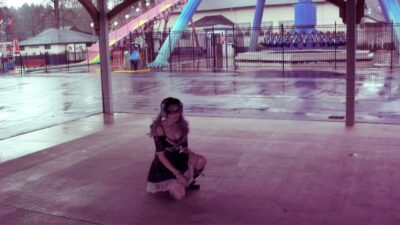
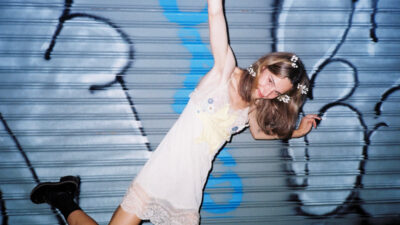
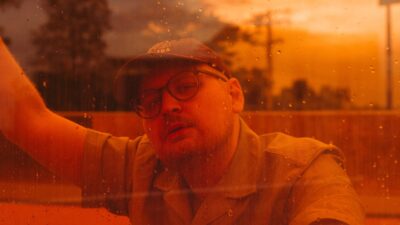
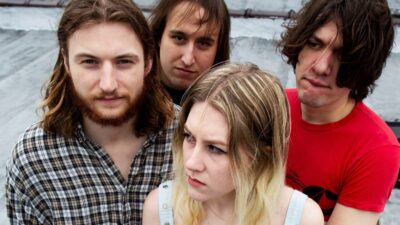
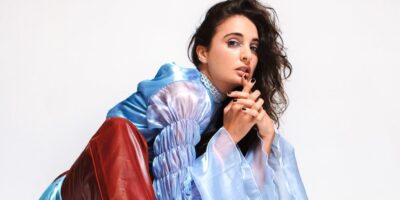
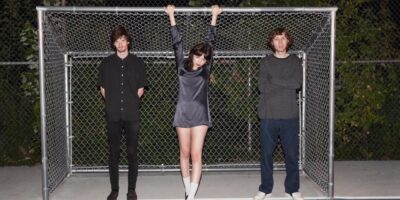
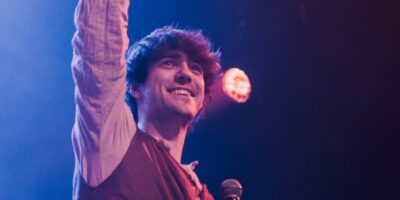
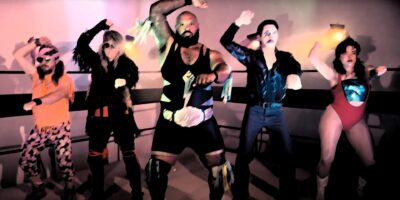
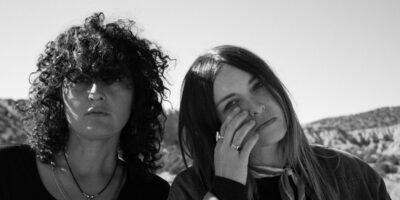
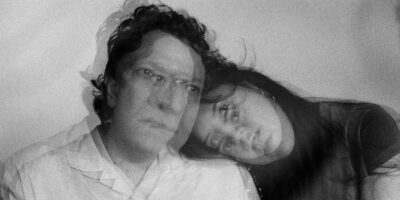




Comments